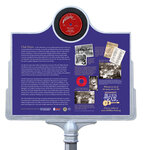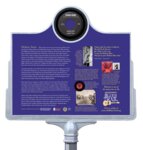

The influences of the Mississippi Blues has spread worldwide like the reaching limbs of the canopy of a large oak with a complex root system that stretches over much of the American south, but the strong trunk at the center sits firmly in Mississippi. “Welcome to Mississippi, the birthplace of America’s music” State welcome signs proudly say.
You can throw a dart at a map of the state and no matter where you hit, you aren’t far from a part of this great tradition. There are even a few in Madison County.
Canton is a crossroads for many things. From the Civil Rights Movement to music, specifically gospel and blues, to the modern film industry. Canton has two Mississippi Blues Trail markers and influential artists like harmonica player and rapper Grady Champion, Johnny Temple and slide guitarist Sonny Landreth were born there.
Perhaps the most influential Bluesman who can trace their roots through Canton is Holmes County native, so-called “King of the Slide guitar” and 1992 Rock and Roll Hall of Fame inductee Elmore James.
“Ahh, you babes talk about your Madison shoes
We got a thing we call the Madison blues
We do the Madison blues
We do the Madison blues
We do the Madison blues baby
Rock away your blues”
That is the first verse of the 1960 song “Madison Blues” recorded by James. It is hard to tell exactly what “Madison” refers to but it is absolutely true that James honed his loud style in Canton in an electronics repair shop owned by his adopted brother, Robert Holston, called Robert’s Radio Repair.
The show was on Hickory Street, around the area of the modern-day Blues marker at the corner of Hickory Street and West Center Street. It held the address 153 Hickory Street.
James arrived in Canton sometime during his time in the United States Navy During World War II where he was promoted to coxswain and took part in the invasion of Guam.
In their spare time at the shop, James and Holston experimented with different electronics, Frankensteining equipment together from the wealth of spare sound equipment parts they had on hand to develop a loud and powerful electric blues style.
James would take his skills on the road ending up in the Chicago scene playing in studio bands and cutting records of his own until he would succumb to a heart attack. He is buried in Ebenezer, Mississippi, which has Blues Trail marker of its own.
The shop was just one of the cultural touchstones in the area. Hickory Street earned a Mississippi Blues Trail marker for being crammed with clubs, bars and cafes where James, B.B. King, Howlin’ Wolf and Sonny Boy Williamson II plied their trade. It is known as “The Hollow.” Some of the best-known clubs included Bessie’s Hideaway and The Star Lite Cafe.
The Hickory Street scene cascaded out into other parts of town with Club Delece on Franklin Street, the Blue Garden on Liberty Street and the Sawmill Quarters east of town where entertainers like William “Do-Boy” Diamond and fiddler Theodore Harris played country suppers and dances hosted by the employees of the Denkmann Lumber Company who lived in a cluster of shotgun-style houses. K.C. Douglas, who appears later in this story, said that Harris drew large crowds that blocked off the streets in the area.
“To spend one night with you in our old rendezvous,
And reminisce with you that's my desire.
To meet where gypsies play, down in that dim cafe,
And dance 'till break of day that's my desire.”
James Brown was singing about a woman, not a club in Canton, but it is very possible he sang that song, “That’s My Desire”, about a woman at a club in Canton.
Perhaps the most important nightspot in town was New Club Desire on Union Street, the current site of the town’s second Blues Trail Marker where it crosses Cross Street. The club is also known simply as Club Desire.
Club Desire was owned by Clarence Chinn, brother of Civil Rights activist and Canton’s Headstart namesake, C.O. Chinn. The Chinns formed the center of the African-American community in Canton starting in the 1940s. Clarence had a club known as the Blue Garden which was rebuilt after a fire into the Club Desire.
Club Desire hosted national headliners like James Brown, the Platters, Hank Ballard & the Midnighters, Big Job Turner, Bobby Blue Bland and B.B. King at a time where these black artists would have trouble booking a motel room in the state. It was known for holding holiday galas and world-class acts that drew patronage from as far away as Memphis, New Orleans and even Chicago. The club boasted an elegant but celebratory atmosphere strictly enforced dress and behavior codes.
The club cemented its Blues legacy in 1952, just two years after the rebuild and rename, California based Modern Records rented the room and transformed it into a makeshift recording studio to record Elmore James. The session was reportedly set up by the now infamous Ike Turner of Clarksdale, who was a talent scout for the label at the time. The session featured Turner on piano and two members of James’ band, likely Canton locals Ernest “Frock” Odell and Precious “Little Hat” Whitehead.
Club Desire would close in the 1970s but enjoyed a rich life as crossroads for musical innovation, socializing and civil rights organization.
“Well if I had money
Tell you what I'd do
I'd go downtown and buy a mercury or two
Crazy 'bout a mercury
Lord, I'm crazy bout a mercury
I'm gonna buy me a mercury
And cruise it up and down the road”
Those are lyrics from the Blues song “Mercury Boogie,” better known as “Mercury Blues.” The song has been recorded by the Steve Miller Band, Ry Cooder and Dwight Yoakam. In 1992, Alan Jackson had a number two hit on the U.S. country charts and beloved hard-rock oddball Meat Loaf recorded the song as a hidden track on his 2003 album Couldn’t Have Said it Better. Jackson’s version would also be modified for a Ford commercial — “…crazy ’bout a Ford Truck,” he sang while driving one over all manner of backcountry roads.
The song was originally written by rural Bluesman K.C. Douglas and recorded as a single in 1948 for San Francisco-based record label Down Town, a long way away from Douglas’ native Mississippi. Douglas was born on a small farm in Sharon in November 1913. Sharon is a small unincorporated community in northern Madison County about 12 miles southwest of Camden and seven miles northeast of Canton.
He was heavily influenced by Blues recording released by the hard-drinking Tommy Johnson in 1928 when Douglas was 15 years old. The Bluesman would struggle most of his life and wouldn’t be able to support himself playing music until about 1970. In 1934 he worked odd jobs in Carthage and Grenada for about two years before meeting Tommy Johnson, his music idol, impressed him with his voice and guitar work and started playing street corners and parties with him.
By 1945 Douglas had not found widespread success but had made it to Vallejo, California, where he worked in the naval shipyards and would be sucked into the San Francisco and Oakland Blues scene. Though Douglas could not support himself fully on music he had a band called the Lumberjacks he formed in 1947, recorded his record in ’48 and would get steady gigs at dance halls throughout the 1950s and 1960s. During this time he continued to work odd jobs including, allegedly, as a mechanic in musician Steve “Seasick Steve” Wold’s family’s garage where he taught the young Wold how to play Blues guitar and finally landed at the Berkley Public Works Department in 1963 and was likely the last honest job of his life.
Douglas played and recorded relentlessly finally earning a break just five years before his death with a performing spot at the Berkley Blues Festival in 1970. He would continue to play and record, releasing albums in 1973 and 1974. He died of a heart attack in October 1975 at the age of 61 and is interred in the Pleasant Grove Cemetery in Sharon.